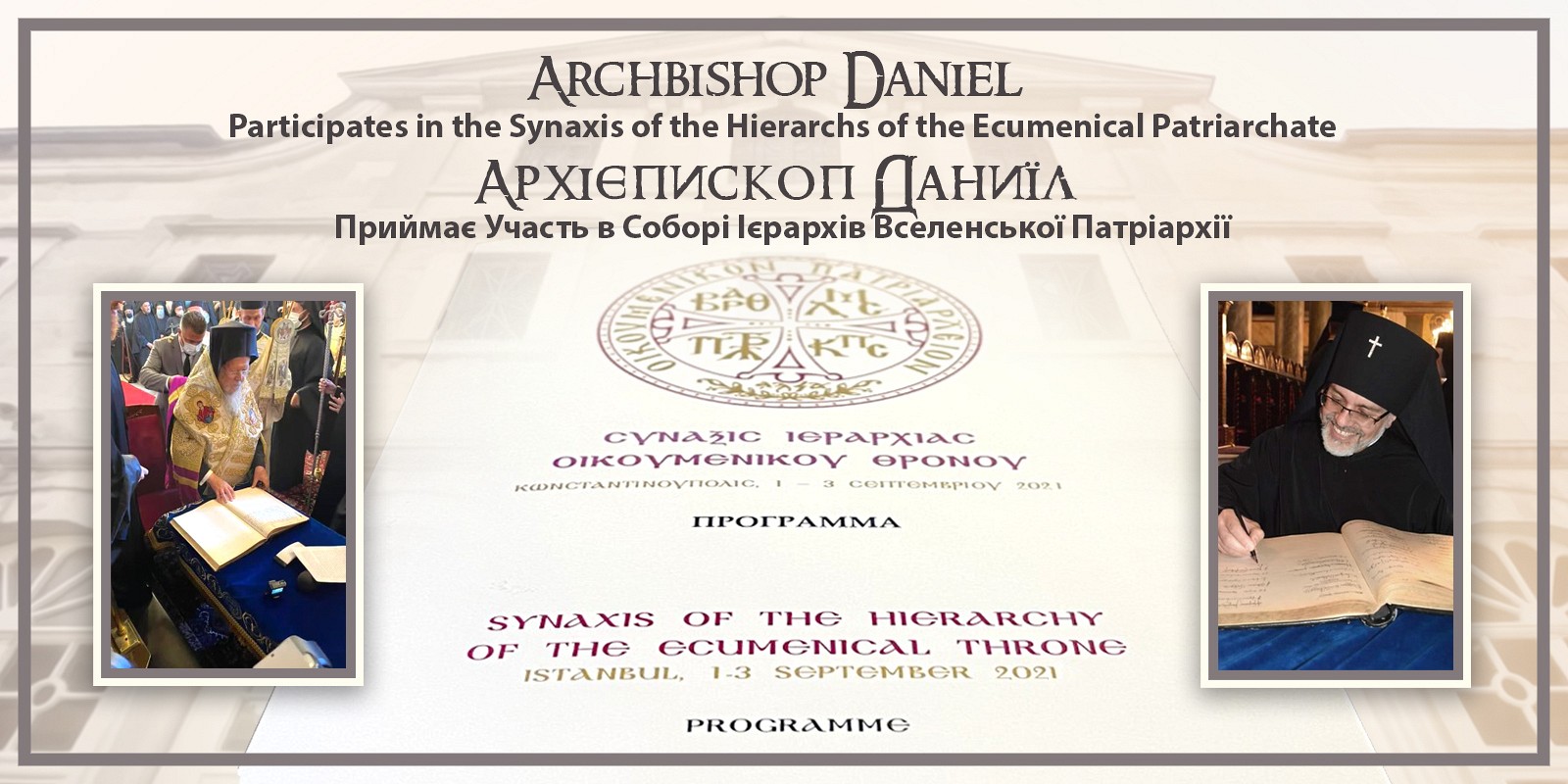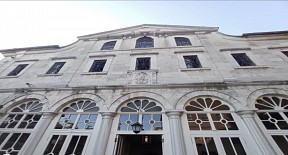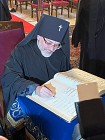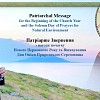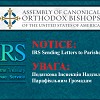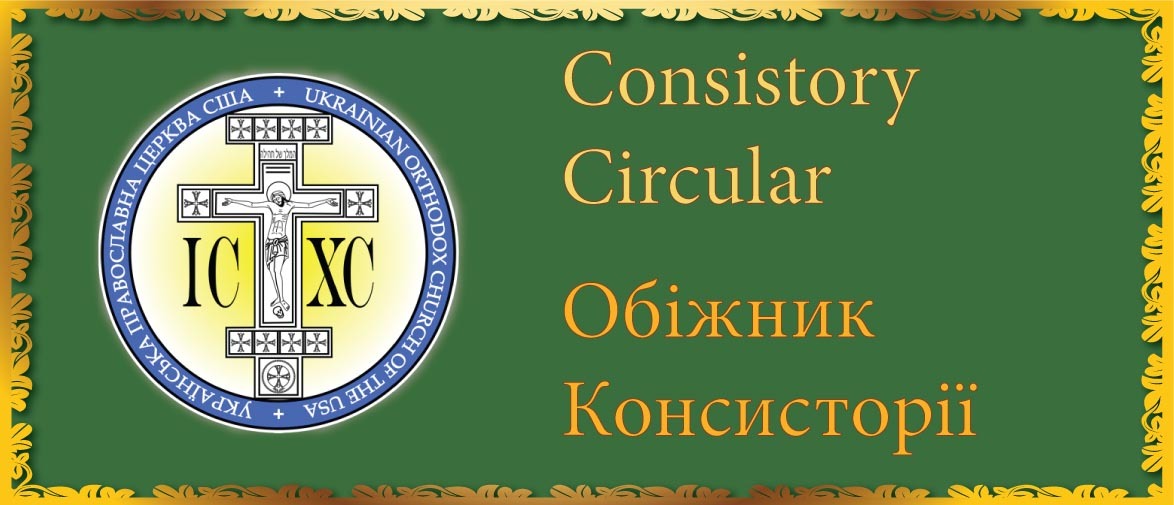On Wednesday, September 1, 2021, His Eminence Archbishop Daniel joined the Hierarchs of the Ecumenical Throne from across the globe in order to co-preside with His All-Holiness Ecumenical Patriarch Bartholomew at the Divine Liturgy in the Venerable Patriarchal Church of Saint George in commemoration of the feast of Indiction — the proclamation of the New Ecclesiastical Year.
At the conclusion of the Divine Liturgy the Service of the Indiction took place, during which the Patriarchal Prayer was offered for the new Indiction. Then His All Holiness signed the special Codex of the Great Church and subsequently all the co-officiating hierarchs signed as well according to their seniority.
In his Message, the Ecumenical Patriarch pointed out that in our time, “the natural environment is threatened more than ever in the history of mankind.”
His All Holiness emphasized that “…the Feast of the Indiction, the solemn day of prayers for the natural environment, finds once again humanity confronted with intense weather conditions due to mounting climate change, with devastating floods and fires across the globe, as well as with the Coronavirus pandemic and its socioeconomic consequences.
The fact that the restrictive measures in transportation and the limits imposed on industrial production have resulted in a reduction of pollutants and emissions, offered an additional valuable lesson on global interconnection and on the interdependence of all dimensions of life. Moreover, it has been also revealed anew that the Ecumenical Patriarchate’s ecological initiatives, which comprise an extension of the Church’s theology and liturgical tradition, correspond with scientific findings and with experts’ recommendations calling for multifaceted mobilization in order to protect the integrity of the natural environment.
We thus pray for the swift overcoming of the consequences of the health crisis and for the illumination from above of governments throughout the world, so that they do not return to or persist upon economism, to those principles of organization of the economic life, of production and consumption, of exhaustive exploitation of natural resources, principles that prevailed prior to the pandemic. Further, it is our genuine desire that the dissemination of pseudoscientific opinions concerning the purported dangers of the Covid-19 vaccines, the slander aimed toward specialists of the medical field, and the unfounded degradation of the seriousness of the disease, be terminated. Unfortunately, similar opinions are propagated in regard to climate change as well, its cause and its disastrous effects. The reality is entirely different, and must be faced with responsibility, collaboration, joint actions, and common vision…”
The Patriarch continued: “Throughout this difficult period, it is an essential pastoral duty of the Church to undertake initiatives for the containment of the pandemic. And it is also a categorical ethical mandate to support global access to the immunization against the coronavirus, especially in poorer nations, in accordance with the words of our Lord, “Inasmuch as you have done it unto one of the least of these my brethren, you have done it unto me” (Matt. 25:40). We ought to love one another “as Christ has loved us” (Eph. 5:2) and to show ourselves as “priests” of creation, safeguarding and cultivating it with care and affection, and, offering in thanksgiving this exceedingly precious gift of God’s Grace unto the Creator of all.”
This occasion also coincides with the triennial Synaxis of Hierarchs of the Ecumenical Throne, which takes place in Constantinople (Istanbul, Turkey) September 1-3, 2021, under the chairmanship of His All-Holiness Ecumenical Patriarch Bartholomew.
+ + + + + + + + + + + + + + + + +
On September 1/14 we celebrate the beginning of the Indiction, that is, the beginning of the new ecclesiastical year.
Before the Constantinopolitan Indiction was introduced by St. Constantine the Great in 312 and decreed by the Fathers of the First Ecumenical Council in Nicaea (325 A.D.), the day of Indiction varied based on local tradition.
The word Indiction is birthed from the Latin word meaning to proclaim. It established the annual land tax to support the needs of the empire and its armed forces and was issued for 15-year cycles. This is the Roman imperial decree, according to which the citizens of the Roman Empire had to pay a tax for the maintenance of the army on the first of September, the beginning of the financial year.
Due to the fact that the month of August the harvest of several kinds of fruits of the year is being completed, the month of September is counted as the beginning of the new year. It was the month of September when the harvest was gathered and thanksgiving offered to God (see Exodus 23:16), a festival connected to the Savior’s entry into the synagogue in Nazareth whose passage from the Gospel of St. Luke (4:16-22) is read on September 1/14.
It was also the month of September when St. Constantine, through the power of the Holy Cross, defeated Maxentius and granted Christians freedom of confession.
Today, the month of September continues to be the time of harvest for farmers, in addition to ushering in the start of the school year.
The Biblical-based traditions and Church customs regarding the Ecclesiastical New Year continue to be honored, especially by the Ecumenical Patriarchate of Constantinople. Each year, on September 1st, members of the Holy and Sacred Synod, led by the Ecumenical Patriarch (currently His All-Holiness Bartholomew), gather at the Patriarchal Church of St. George the Great Martyr in the Phanar to concelebrate the Divine Liturgy, venerate the Holy Panagia Pammakaristos Icon and proclaim the New Year. They also sign the Patriarchal and Synodal Tome for the Indictus, an ancient practice dating back to the time of Constantine the Great (+337).
More recently, the entire Orthodox Church, led by the Ecumenical Patriarchate, has declared September 1st as a day of prayer for the preservation of God’s creation and the protection of the natural environment.
The ecclesiastical calendar, and in particular the Orthodox Church’s cycle of feasts, is rich and wondrous.
For starters, the liturgical books used are a treasure of hymns and prayers composed by the Fathers of the Church which sustain the annual cycle of feasts, as well as the daily liturgical services. Some of them are well known, like the Epistle and, of course, Gospel Book, but all of them, such as the Psalter, Horologion and Triodion, are sacred and without comparability in all of Christendom.
The Orthodox commemoration and celebration of saints is also without parallel.
To begin with, each day of the week has been assigned a special theme, beginning, naturally, with the Lord’s Day:
Sunday: Glorious Resurrection of Christ
Monday: Angelic Powers
Tuesday: Holy and Glorious Prophet, Forerunner and Baptist John
Wednesday: Holy Cross and the Mother of God
Thursday: Holy Apostles and Saint Nicholas the Wonderworker, Archbishop of Myra
Friday: Holy Cross
Saturday: All the Saints and Souls of the Departed
The Church has also identified the Twelve Great Feasts with Pascha being first without equal.
The day-to-day riches of the ecclesiastical calendar, which are not well known outside Orthodoxy, are the celebrations of saints, be they apostles, prophets, martyrs, hierarchs or monastics. Each day, the Church commemorates the memory and lives of different saints, as catalogued and described in the Synaxaristes, which abound with examples of spirituality and virtue such as ceaseless prayer, fasting, humility, patient endurance, sacrifice, chastity and martyrdom, all of them woven together by love, the greatest of virtues: love for man and love for Christ.
Saints provide the faithful courage and hope; their lives serve as guideposts with directions and instructions for believers. The martyrs of the Church — beginning with the first male (St. Stephen the Archdeacon) and the first female (St. Thekla) martyrs, to the Christians martyred throughout the Middle East and across the world each and every day — hold a particular honor and serve as a reminder that the material goods of the earth are temporary and that this life is fleeting, while the life to come is eternal.
The daily cycle of feasts connect us to all the saints, to the Ever-Virgin Mary and above all, to Jesus Christ our God. The Ecclesiastical New Year reminds us to recalibrate our lives and center our schedules as much as possible around the Church for, as St. Cyprian the Hieromartyr (+258) says, “A person cannot have God as his Father if he does not have the Church as his Mother.”
Source: Huffington Post and the Church of Cyprus
Photos by Yani Kayakoparan and the Ecumenical Patriachate of Constantinople
(41 images)
|
| |||||||||||||
